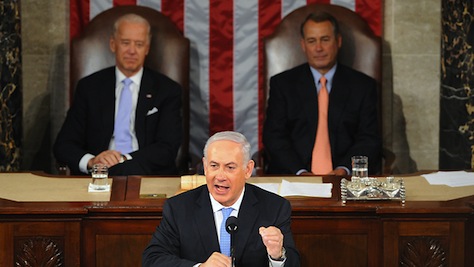Washington, it’s not always about you. ![]()
![]()
For a week, US House speaker John Boehner’s decision to invite Israeli prime minister Benjamin Netanyahu to address a joint session of the US Congress has stirred controversy in the capitals of both countries, but especially in Washington, where commentators of all political stripes are attacking the veteran Israeli leader for the breathtaking breach of protocol in bypassing the administration of US president Barack Obama and dealing exclusively with Obama’s political opponents in the legislative branch. The Atlantic‘s Jeffrey Goldberg, perhaps the leading US commentator on Israeli affairs and the bilateral relationship, slammed the move in a piece on Tuesday headlined, ‘The Netanyahu disaster.’
Yes, Netanyahu wants to stop Iran from becoming a nuclear power, and he’s made it clear that he will stop at nothing to thwart Tehran from enriching even the tiniest bit of uranium in its quest to develop its nuclear energy industry — to say nothing of a nuclear-armed Iran.
Yes, Netanyahu is a political foe of the Obama administration and, time after time, he’s gone out of his way to indicate his disapproval of its approach to Iran and other issues central to Israeli regional security. Netanyahu has increasingly developed common cause with the US right, and he has a fervent supporter in Sheldon Adelson, one of the wealthiest Republican donors in the United States (he almost single-handedly bankrolled former speaker Newt Gingrich’s 2012 presidential bid) and a top Netanyahu financier in his own right.
But neither of those are the real reason that Netanyahu is so eager to speak before the US Congress, now entirely controlled by the Republican Party. Nor will Netanyahu be dissuaded by arguments that it’s a fantastic breach of protocol that will make an already tense relationship with the Obama administration worse. After all, Netanyahu practically endorsed Mitt Romney, Obama’s Republican challenger for the presidency in 2012, and he easily won his own battle for a new term as Israeli prime minister two months after the American presidential election. The potential of alienating a sitting US president certainly didn’t harm Netanyahu’s own domestic political prospects two years ago. The fact that Netanyahu is one of the few US allies who so often publicly contradicts the US president might even boost his standing among Israeli voters.
The real impetus for Netanyahu?
His scheduled appearance comes just two weeks before he faces what will be his toughest election battle since 1999, when he lost an election to Ehud Barak, then the leader of the Labor Party (מפלגת העבודה הישראלית). Continue reading The real reason Netanyahu is coming to Washington
